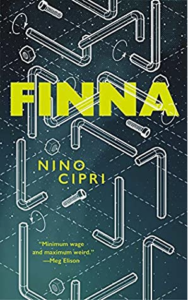Who hasn’t wondered whether all those twists on the path through Ikea might not lead somewhere else entirely? In Nino Cipri’s Finna, the Ikea stand-in LitenVärld (it means “little world” in Swedish) has a recurring problem with wormholes opening within its stores and leading to LitenVärld analogues in parallel universes. Not that management tells anyone, of course. In fact, there used to be in-store experts for dealing with the wormhole problem but budget cuts and restructurings made that expertise a thing of the past.
Finna opens with Ava trudging in to work at LitenVärld one miserable Tuesday in February. She’d rearranged her schedule to avoid encountering her co-worker ex, Jules, but finds herself coming in to substitute for a different co-worker on a day when Jules also works. That sets up what was, for me, the less interesting thread of Finna: young people having to deal with an ex like another human being. The better part of the story gets going when a “young woman with olive skin and thick, black-brown hair approached the [customer service] desk” where Ava is working and says says, “I’m sorry to bother you, but I think I lost my grandmother.”
She continues, “‘She was right behind me in the showrooms? I turned around to get her opinion, and she was gone. I’ve been looking for her for ten minutes and …’ She trailed off, shrugging helplessly.” It’s the kind of thing that happens all the time, but in this case time drags on, no grandmother. PA announcement, no grandmother. And on a February weekday, there aren’t exactly crowds for her to have gotten lost among. The shift manager eventually sends Ava out to look for the lost grandmother, whereupon she bumps into Jules who explains the horrors that led them to volunteering to search.
“‘A soccer mom enlisted me to help harangue her husband into shelling out money for a new bathroom vanity. She managed to misgender me four times in two minutes,’ Jules said. They bent down to pick up the books they’d knocked off the shelf. ‘Two different pronouns, completely ignored my nametag, eventually settled on calling me “the kid”‘.” Gosh. A complete stranger, someone that Jules clearly looks down on to begin with, in an interaction that is by design impersonal, made an effort to accommodate Jules’ preferences and flubbed it. That could just ruin your whole day. Definitely a reason to run away.
Anyhow, Cipri wouldn’t be able to tell the kind of story they want to tell if they don’t bring Ava and Jules together. Ava and Jules are having a tiresome post-breakup fight when Jules notices that things around them aren’t quite the way they should be in LitenVärld.
Jules had stomped into a separate room that shouldn’t have existed, a room Ava hadn’t seen from the walkway. Its design was radically different: bright, colorful, filled with floral prints and fake plants, posters of fantastic places on the wall. It resembled the Midlife Crisis Mom room, but that was on the other side of the store, and been painted a warm peach color. This one was done in sand and cerulean
Past the edges of the cube, Ava could see a whole other walkway, one that shouldn’t exist. Her gaze traveled up, and she gasped as she saw a seam connecting the two rooms. It was a dark purple, the color of a fresh bruise, and wriggled and squirmed as if it were alive.
With that, the story gets going. Jules becomes less of a wet blanket. They find evidence that the lost grandmother has gone into the dimension that has suddenly appeared, and there is nothing for it but to follow her. Before they do, there’s some more relationship tediousness and some satire of employee meetings and corporate training videos that fell flat for me, but eventually the tale goes where it needs to, with Ava and Jules looking for the lost grandmother in alternative LitenVärlds. Some of those are weird, some of those are creepy, some are scarier still, and some offer better models of what markets and people could be like. Jules and Ava have to figure out what to do if they find the grandmother or, worse, if they don’t.
The opening of alternative dimensions also presents Jules and Ava with the choice of not returning to the mundane world. Very little of Jules’ back story is sketched, but Ava says they had often talked about their wanderlust, about heading out into the wide world and never looking back. The implication is that Jules’ home life had not been happy. Cipri says even less about Ava’s background, but given that the whole story turns on the granddaughter’s distress that her grandmother has vanished, it’s remarkable that Ava seems to give no thought to anyone that her potential disappearance into a different dimension might affect. Remarkable in a way that does not reflect well on Ava.
The worlds that Ava and Jules visit are interesting, and the action that takes place there is exciting and engrossing. One of the characters they meet elsewhere is the best in the novella — I’d read the heck out of her stories — with the granddaughter running a close second. Ava and Jules, unfortunately, get the eight deadly words from me.
+++
Doreen liked Finna much, much better than I did. Her review is here.

